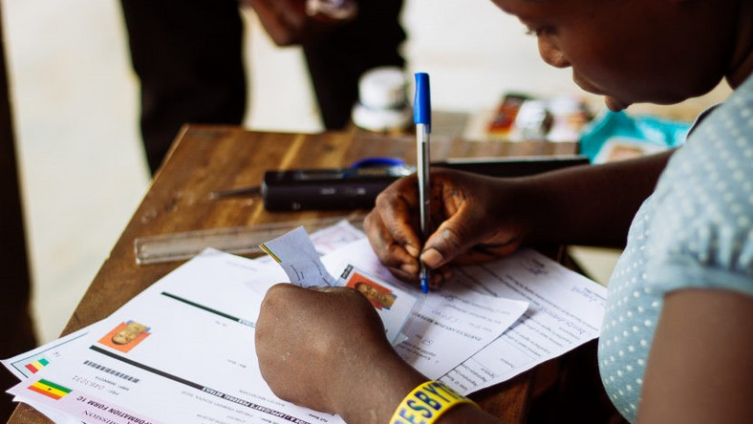Ghanaians go to the polls on Dec. 7 to choose a new president and parliament in an election investors are watching closely to determine how the winner will steer an economy emerging from debt default.
The leading contenders to replace 80-year-old President Nana Akufo-Addo, who is stepping down after two terms at the helm of the gold and cocoa-producing country, are former president John Dramani Mahama and current Vice President Mahamudu Bawumia. There are 11 other candidates.
Ghanaians go to the polls on Dec. 7 to choose a new president and parliament in an election investors are watching closely to determine how the winner will steer an economy emerging from debt default.
The leading contenders to replace 80-year-old President Nana Akufo-Addo, who is stepping down after two terms at the helm of the gold and cocoa-producing country, are former president John Dramani Mahama and current Vice President Mahamudu Bawumia. There are 11 other candidates.
Mahama, 65, who is leading in a number of polls, has pledged to try and renegotiate the terms of the IMF deal to secure more financing. He has promised to amend the law to introduce a public debt ceiling of 60-70% of GDP to prevent over-borrowing.
But under his previous presidency in 2012-17, the government increased borrowing to invest in the construction of infrastructure projects like roads. He also faced criticism for electricity shortages and high inflation.
Bawumia has campaigned on modernising the economy with digitisation, low taxes and fiscal discipline to lift annual growth to an average of 6%.
The 61-year-old has also pledged to cap public spending at 105% of the previous year's tax revenue, introduce a flat rate tax scheme and redirect 3% of GDP of public spending into private hands for the provision of public infrastructure.
CAN THE WINNER RENEGOTIATE THE IMF PROGRAMME?
It is fairly common for leaders coming into office to reach out to the IMF and talk about existing programmes - as was just the case in Sri Lanka.
The IMF, lender of last resort to Ghana as it restructures its debt under the G20's Common Framework initiative, says its primary focus is to support the government in restoring macroeconomic stability while enabling debt sustainability and inclusive growth.
It has so far approved Ghana's economic performance under the current $3 billion loan programme.
The Fund says there is a possibility of adjusting Ghana's current programme, since IMF-supported reform programmes are developed jointly with governments and reviewed periodically.
However, any discussions need to take into account the need to preserve a country's ability to achieve set economic objectives.
WHAT ARE THE OTHER ECONOMIC ISSUES AT PLAY?
Whoever wins the election will have to tackle a cost-of-living crisis, widespread unemployment, high costs of living and frequent electricity outages.
Mahama's party, the National Democratic Congress, plans to increase government spending in social sectors like health and education if it wins, as well as the infrastructure, to support growth and create employment.
Bawumia's New Patriotic Party wants to prioritise economic stability by lowering inflation and attracting more private investments.
The next government will face limited choices due to Ghana's high debt burden, Oxford Economics said in a research note. Mahama's promises on the campaign trail to boost the economic circumstances of individuals and households could also be tested by the need to balance his policies against IMF's demands for fiscal restraint, the consultancy's analysis showed.
COMMODITIES AT STAKE
The new government will have to steer the processes of licensing new oil and gas projects, where production, which began in 2010, flagged in the five years to 2024.
Mahama plans to offer locals more ownership in future oil and mining projects if he wins.
The cocoa sector also requires urgent attention.
Output in the world's number two cocoa-producing country fell to a 20-year low last season, mired by low pay to farmers, plant diseases, heightened bean smuggling and illegal gold mining destroying plantations.
The global cocoa market will be watching with interest whether a new president will implement an IMF policy suggestion for far-reaching reforms in the sector, and whether a new marketing model that replaced the over three-decade-old cocoa loan syndication will be continued.
Latest Stories
-
‘Daughter of a murderer’ comment: Majority pushes for NPP backbenchers to face Privileges Committee
6 minutes -
Buoho residents want quarry activities streamlined to ease exposure to risk
8 minutes -
Unemployed teachers call for employment to address staff shortage
11 minutes -
Suspended Chief Justice has right to choose trial venue – Ansa-Asare
20 minutes -
Big Chef Junior S4: Kitchen heats up as contestants take on Indomie challenge
36 minutes -
Wontumi picked up by EOCO on his way from CID interrogation
45 minutes -
Photos: Mahama attends AfDB annual meetings in Côte d’Ivoire
49 minutes -
‘Haul the Finance Minister’ – Minority Chief Whip fumes over unpaid state funds
55 minutes -
CJ removal saga: Let’s end ‘this whole controversy’ – Dr. Ansa-Asare
57 minutes -
Top 20 finalists announced for 7th Africa Youth in Tourism Innovation Summit & Challenge
1 hour -
Christ the King youth lead blood donation campaign
1 hour -
E Vibes to host Nkyinkyim on musical band series
1 hour -
Importers and Exporters Association urges Ghana Gold Board to sustain efforts in strengthening the cedi
1 hour -
Trump administration moves to cancel all remaining federal contracts with Harvard
1 hour -
KMA cracks down on drivers failing to reduce transport fares
2 hours

